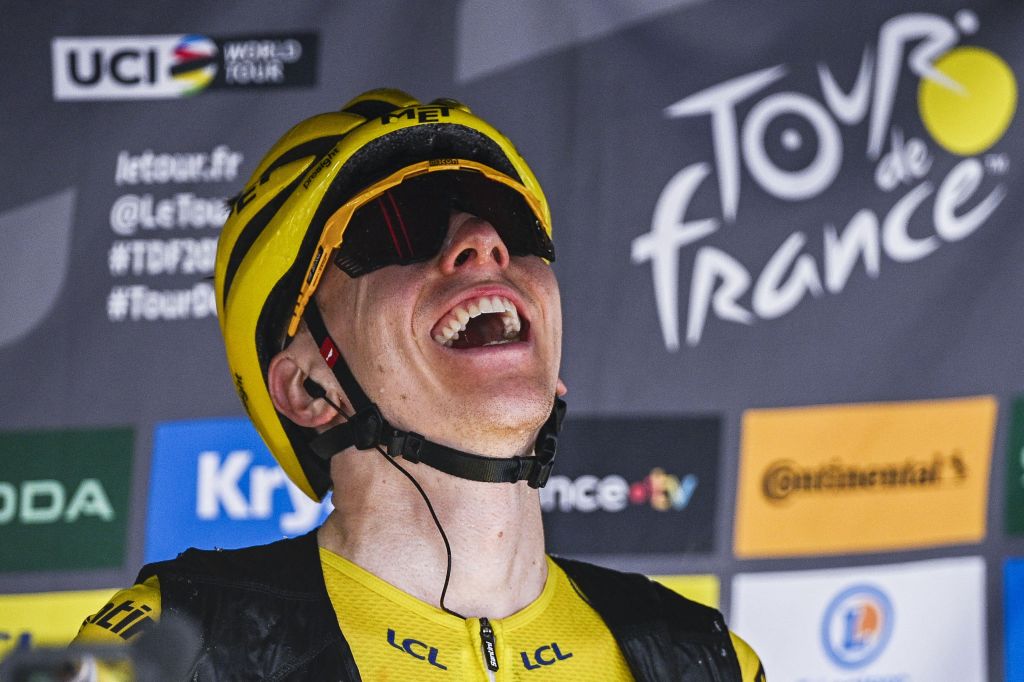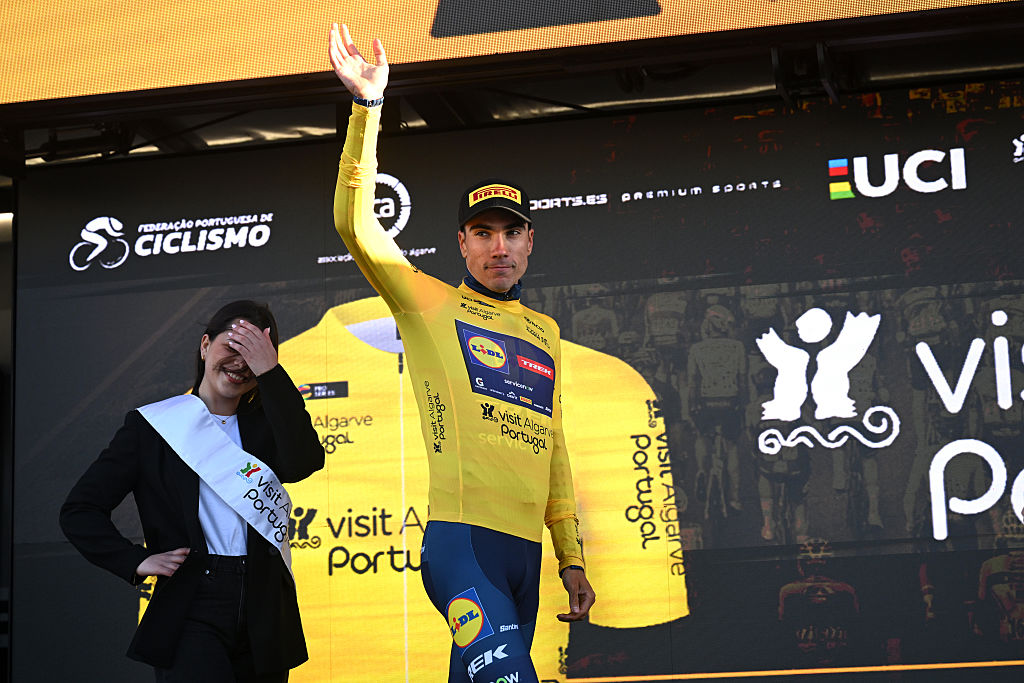‘In the end, I think I cracked him’ – Tadej Pogačar overwhelms Jonas Vingegaard at Tour de France
Slovenian shatters Marco Pantani’s time on Plateau de Beille with astonishing display on stage 15

The latest race content, interviews, features, reviews and expert buying guides, direct to your inbox!
You are now subscribed
Your newsletter sign-up was successful
Tadej Pogačar has been performing miracles so often as to make them seem mundane. By this point in his career, he has exhausted as many superlatives as he has rivals. But amid his astonishing repertoire, his display at Plateau de Beille on stage 15 will ultimately stand out as a defining work.
For most of his career, Pogačar has been compelled to participate in two races at once, one on the road against his current rivals and the other in the imagination against the giants of eras past. Such is the burden of the man who has been touted as the new Eddy Merckx for the bones of the past four years.
On Sunday, Pogačar outpaced his contemporary rival Jonas Vingegaard by 1:08 to push his overall Tour de France lead beyond three minutes. In the race against posterity, meanwhile, he beat the late Marco Pantani’s 1998 record at Plateau de Beille by a startling 3:40.
It had long been believed that the records from that era of excess were all but unbeatable, though that certainty has been fraying during cycling’s supersonic 2020s. Even so, nobody could have anticipated that Pogačar would sail past it as casually as this, providing something like cycling’s equivalent of Bob Beamon’s jaw-dropping leap into history at the Mexico Olympics.
“I don’t know how Pantani rode back in the day, that’s almost now 30 years ago,” Pogačar said in the press conference truck afterwards. “But today Visma set a super, super strong pace from the beginning and then Jonas did most of the work until my attack. Then I pushed my limit. I’m just super happy to take the win and I’m not thinking about the Strava segment.”
Double
Never mind Strava, Pogačar is racing against history. No rider has won the Giro-Tour double since Pantani in 1998, but the Slovenian has moved considerably closer to that feat after his crushing display here.
When Pogačar won more or as less as he pleased in Italy in May, racking up six stage wins and claiming Giro d'Italia victory by almost ten minutes, the caveat was that he was lacking competitors of his exalted level. The same cannot be said of this Tour, where he is racing against the deepest field of the season and, of course, against Vingegaard, the man with whom he has duelled so closely these past three Julys.
The latest race content, interviews, features, reviews and expert buying guides, direct to your inbox!
Pogačar had already put 40 seconds into Vingegaard with his late attack at Pla d’Adet on Saturday, but the Dane was bullish afterwards about his prospects of returning the blow with interest on stage 15, on a day that seemed likely to reward endurance as well as explosiveness.
Visma-Lease a Bike duly took up the reins of pace-making in the yellow jersey group in the finale, with Matteo Jorgenson setting a fierce tempo after the race swung through Tarascon-sur-Ariège and began the 16km haul to the line.
Vingegaard’s inevitable attack came with 10.5km to go, and Pogačar was immediately on his wheel. He stayed locked there for the next 5km, assessing his rival’s pedalling from close range. When Vingegaard cast a weary glance over his shoulder with 5.5km remaining, Pogačar understood the moment had come. Match point. He climbed from the saddle and accelerated past the Dane.
“He set a super good pace, but when he finally attacked again – the final attack from him, just before my attack – I saw that maybe I could do some difference from him if I tried,” Pogačar said. “It was really hard to break him and to make the bigger gap. I was going all-out to the finish line.”
At first, as per the usual pattern of their duel, Vingegaard managed to hold Pogačar’s advantage at 20 metres or so, but the gap steadily yawned outwards thereafter, with the yellow jersey essentially gaining 10 seconds per kilometre on the upper portion of the climb. Vingegaard, like Remco Evenepoel – third on the day at 2:51 – also finished inside Pantani’s old record on the climb. The trouble was that Pogačar had raised the bar to heights never seen before.
“I was going all-out to the finish line,” Pogačar said. “I was all the time hearing he was at 35 seconds, 35 seconds. I thought he was maybe recovering and coming back, but in the end, I think I cracked him and I’m super happy to have this gap.
“I could not imagine for a better weekend. Today I was counting down the final kilometres, the final minutes because it was so hard. But it was worth it in the end, I was super happy.”
In the overall standings, Pogačar now leads Vingegaard by 3:09 and Evenepoel by 5:19, while everybody else is more than ten minutes down. At this remove, the yellow jersey’s surprising struggles on the Col de Pertus on stage 11 look like a blip rather than a turning point. For all Vingegaard’s aptitude for the rigours of the third week, it seems increasingly difficult to imagine anything other than a Pogačar victory in Nice next Sunday.
“The Tour finishes when you arrive normally on Champs-Élysées but this year it’s Nice,” Pogačar smiled. “When we arrive on the main street of Nice, then it’s finished. We can speak about the finish then, not before. We will stay focused until that moment.”
Escapee Tobias Halland Johannessen (Uno X-Mobility) spoke for many when he described the feeling of being caught and passed by Pogačar and Vingegaard on Plateau de Beille: “It’s like I don’t do the same sport.” Not for the first time, Pogačar made it all look so disarmingly easy here.
“I also breathe and suffer,” he said. “But it’s just the way it is. Some people suffer more, some people suffer less. It’s how it is. It’s a bike race, no?”
Get unlimited access to all of our coverage of the Tour de France - including breaking news and analysis reported by our journalists on the ground from every stage of the race as it happens and more. Find out more.

Barry Ryan was Head of Features at Cyclingnews. He has covered professional cycling since 2010, reporting from the Tour de France, Giro d’Italia and events from Argentina to Japan. His writing has appeared in The Independent, Procycling and Cycling Plus. He is the author of The Ascent: Sean Kelly, Stephen Roche and the Rise of Irish Cycling’s Golden Generation, published by Gill Books.
